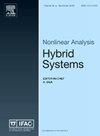Continuous-time constrained linear quadratic regulator for switched linear systems
IF 3.7
2区 计算机科学
Q2 AUTOMATION & CONTROL SYSTEMS
引用次数: 0
Abstract
Switched systems, characterized by a family of subsystems governed by a switching rule, widely apply to complex real-world scenarios. However, their inherent switching dynamics pose significant challenges in phase analysis and control design. To address these challenges, we propose a framework for solving the Continuous-Time Constrained Linear Quadratic Regulator (CT-CLQR) problem for switched linear systems. Our approach partitions the time horizon into a finite number of intervals, each associated with a specific system mode. The duration of these intervals is parameterized by the switching instants, enabling a reformulation of the problem. We indirectly optimize the switching sequence by fixing the switching sequence and optimizing the interval durations. We derive analytical expressions for the cost function and its gradient, which are critical for efficient optimization. Unlike state-of-the-art methods that impose equality constraints on state evolution, our approach inherently considers the state evolution in the cost function. This not only simplifies the problem formulation but also reduces computational overhead by precomputing shared terms offline, enhancing efficiency during online operations. The proposed method significantly advances existing techniques, offering improved computational efficiency and flexibility. We demonstrate the effectiveness of our approach through comprehensive numerical examples, showcasing its potential for practical applications.
切换线性系统的连续时间约束线性二次型调节器
交换系统以一组由交换规则控制的子系统为特征,广泛应用于复杂的现实场景。然而,它们固有的开关动力学特性给相位分析和控制设计带来了巨大的挑战。为了解决这些挑战,我们提出了一个框架来解决切换线性系统的连续时间约束线性二次调节器(CT-CLQR)问题。我们的方法将时间范围划分为有限数量的间隔,每个间隔与特定的系统模式相关联。这些间隔的持续时间由切换时刻参数化,从而可以重新表述问题。通过确定切换顺序和优化切换间隔时间来间接优化切换顺序。我们推导了成本函数及其梯度的解析表达式,这是有效优化的关键。与对状态演化施加平等约束的最先进方法不同,我们的方法内在地考虑了成本函数中的状态演化。这不仅简化了问题的表述,而且通过离线预计算共享项减少了计算开销,提高了在线操作期间的效率。所提出的方法大大改进了现有技术,提高了计算效率和灵活性。我们通过全面的数值例子证明了我们的方法的有效性,展示了它在实际应用中的潜力。
本文章由计算机程序翻译,如有差异,请以英文原文为准。
求助全文
约1分钟内获得全文
求助全文
来源期刊

Nonlinear Analysis-Hybrid Systems
AUTOMATION & CONTROL SYSTEMS-MATHEMATICS, APPLIED
CiteScore
8.30
自引率
9.50%
发文量
65
审稿时长
>12 weeks
期刊介绍:
Nonlinear Analysis: Hybrid Systems welcomes all important research and expository papers in any discipline. Papers that are principally concerned with the theory of hybrid systems should contain significant results indicating relevant applications. Papers that emphasize applications should consist of important real world models and illuminating techniques. Papers that interrelate various aspects of hybrid systems will be most welcome.
 求助内容:
求助内容: 应助结果提醒方式:
应助结果提醒方式:


